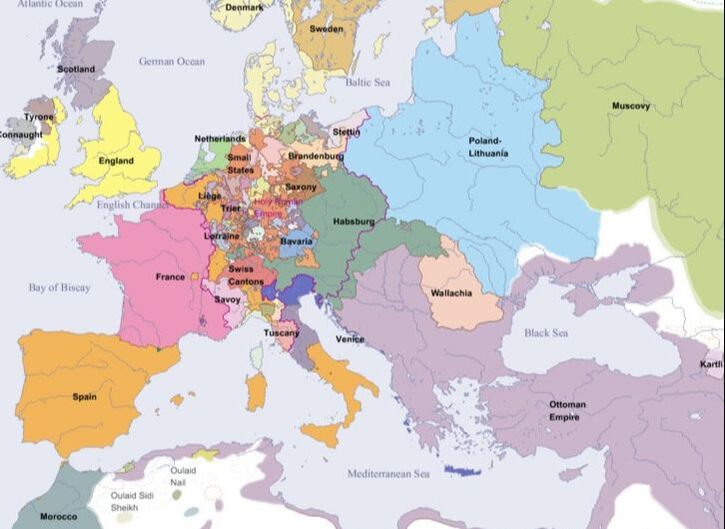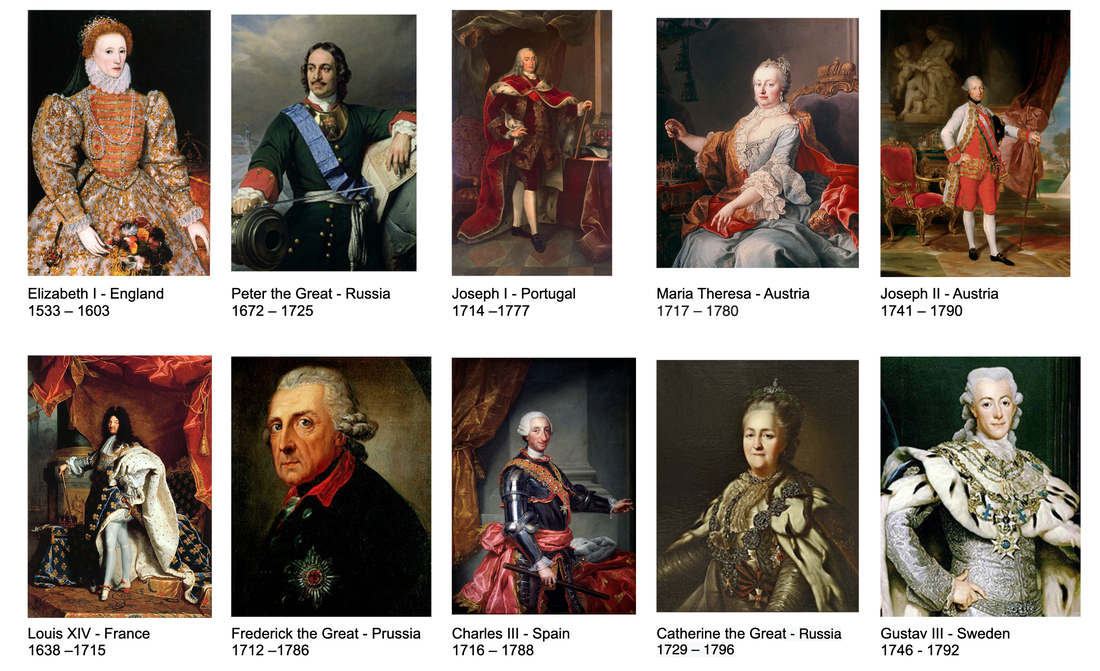Lesson 3 - Centralisation of states and enlightened monarchs
Look at this fantastic time lapse film of European frontiers. (Below left) If you jump forward in time to the middle ages, you'll notice that very few of the nation states that exist today existed then. And even those that did exist had frontiers very different to today. Move the film forward to 1066. Which countries do you recognise that exist today? Which important ones are missing? Then let the film run on. At which times does Europe seem to change most? What causes this? Are there times when nothing much seems to happen? At what point does Europe really start to resemble the Europe of today?
|
|
|
Despite what nations would like you to believe, nations have not existed for very long. The modern nation state was largely created in the 19th century and the concept of nationalism as we understand it today, was also invented at that time.
To understand the origins of nation states, we need to look back again at the late middle ages. As feudalism declined and trade and towns grew, wealth was generated that did not come from the land. The towns needed protection and ease of trade, the monarchs wanted taxes and more and more territory. Powerful monarchs sought to consolidate their power by taking over the territories of weaker neighbours and centralising power. Sometimes though diplomacy, but often through war, in the late 15th and early 16th century the modern nation states began to take on a recognisable shape.
Centralisation in states throughout Europe meant that law making was carried out in the capital city and these laws were applied and enforced throughout the kingdom. Trade flowed more freely across the kingdom as standard laws reduced local tolls, taxes and regulation. Increased wealth and more efficient tax collection made monarchs more able to fund the professional armies that enabled them to defend and expand their territories still further. Power became increasingly concentrated.
To understand the origins of nation states, we need to look back again at the late middle ages. As feudalism declined and trade and towns grew, wealth was generated that did not come from the land. The towns needed protection and ease of trade, the monarchs wanted taxes and more and more territory. Powerful monarchs sought to consolidate their power by taking over the territories of weaker neighbours and centralising power. Sometimes though diplomacy, but often through war, in the late 15th and early 16th century the modern nation states began to take on a recognisable shape.
Centralisation in states throughout Europe meant that law making was carried out in the capital city and these laws were applied and enforced throughout the kingdom. Trade flowed more freely across the kingdom as standard laws reduced local tolls, taxes and regulation. Increased wealth and more efficient tax collection made monarchs more able to fund the professional armies that enabled them to defend and expand their territories still further. Power became increasingly concentrated.
|
What happened when they went to war with each other?
There were many religiously motivated wars in the 17th century but the most significant was the Thirty Years' War. The Thirty Years' War was a war fought primarily in Central Europe between 1618 and 1648. One of the longest and most destructive conflicts in human history, as well as the deadliest European religious war in history, it resulted in eight million deaths. Initially a war between various Protestant and Catholic states in the fragmented Holy Roman Empire, the war became less about religion and more of a continuation of the France–Habsburg rivalry for European political pre-eminence. The Thirty Years' War devastated entire regions, with famine and disease resulting in high mortality in the populations of the German and Italian states. It was one of the reasons why European monarchs fought more limited wars in the century that followed. |
(Below) Europe in 1600
|
|
Peace of Westphalia (1648)
|
The Thirty Years' War ended with the Peace of Westphalia (1648). The war altered the previous political order of European powers. Perhaps the most significant political consequence was the rise of France under the Bourbon Kings. The Treaty of Westphalia not only established the right of monarchs to decide the official religion of their territory but also the modern concept of national sovereignty. This is the idea that there is no higher power than the power of the individual nation state and that no other body or state can have authority over what goes on within the state. The state is independent.
|
Enlightened monarchs
Most European countries in the 17th century were absolute monarchies, Britain, Switzerland and the Netherlands were notable exceptions. Absolute monarchy is a form of monarchy in which one ruler has supreme authority and where that authority is not restricted by any written laws, legislature (parliament), or customs. Many European monarchs, claimed supreme autocratic power by divine right, and that their subjects had no rights to limit their power. This is what political scientists call 'traditional authoritarianism', because power was passed on from father to son, through time and through one family. In some European countries, this form of government lasted until the 20th century. As an inherited power, traditional authoritarianism can be distinguished from modern authoritarianism, which emerged after World War 1 with the rise of authoritarian political parties, such as the Nazis in Germany. There are still some absolute monarchies in the world today, mainly in the Middle East.
As a form of government, they emerged in Europe in the 16th century as new nation states sought to centralise and strengthen their power against enemies abroad and opponents within. Typically this meant imposing one religious faith and weakening towns, regional nobility and representative assemblies. In some countries, this failed as Britain became a constitutional monarchy. In other countries, like France, Prussia (northern Germany) and Russia, it succeeded.
In the 18th century a number of absolute monarchs came under the influence of the ideas of the Enlightenment and they sought to rule according rational and scientific principles of good governance. These monarchs have become known as enlightened despots. They enjoyed the despotic power of absolute monarchs but ruled with the general interests of the nation in mind.
As a form of government, they emerged in Europe in the 16th century as new nation states sought to centralise and strengthen their power against enemies abroad and opponents within. Typically this meant imposing one religious faith and weakening towns, regional nobility and representative assemblies. In some countries, this failed as Britain became a constitutional monarchy. In other countries, like France, Prussia (northern Germany) and Russia, it succeeded.
In the 18th century a number of absolute monarchs came under the influence of the ideas of the Enlightenment and they sought to rule according rational and scientific principles of good governance. These monarchs have become known as enlightened despots. They enjoyed the despotic power of absolute monarchs but ruled with the general interests of the nation in mind.
Activity - Absolute Monarchs - Weakest link balloon debate - Who was the greatest absolute monarch?
There are two aspects to this assessment. You will begin by producing a standard piece of research about one of the absolute monarchs listed below. These monarchs will be allocated randomly. These accounts will be relatively short - 500-600 words - a highly selective, almost hagiographic summary of the life and achievements of your allocated monarch. It is very important that this is written in your own words and accurately referenced with an appended bibliography.
The Monarchs
There are two aspects to this assessment. You will begin by producing a standard piece of research about one of the absolute monarchs listed below. These monarchs will be allocated randomly. These accounts will be relatively short - 500-600 words - a highly selective, almost hagiographic summary of the life and achievements of your allocated monarch. It is very important that this is written in your own words and accurately referenced with an appended bibliography.
The Monarchs
Having completed your research account you then need to prepare for the debate in pairs. Each member of the class will represent a monarch and speak on their behalf. As in all 'balloon debates', the idea is that the balloon is sinking fast and cannot carry the weight of all the people (the absolute monarchs). Each monarch will need to make the case for why they should be saved.
|
In this balloon debate we are also going to incorporate the rules of the popular TV show The Weakest Link. We are going to have a series of rounds. At the end of each round, all the monarchs will vote to jettison one least impressive absolute monarch. In each round you will only be allowed to make one point, the one reason why you should be saved. You will not be allowed to repeat this point in future rounds, so you must prepare enough points (9) if you want to win. As well as a game of history, it is also a game of performance and strategy. It is a game of performance because matters is how well the point is made. It is a game of strategy because you need to decide which are your strongest and weakest points. For example, do you make your strongest points in the early rounds when your chances of survival are greatest or do you save them for when the going gets tough? Watch some of this film in order to get an idea of how it will work.
|
|


